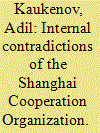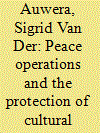|
|
|
Sort Order |
|
|
|
Items / Page
|
|
|
|
|
|
|
| Srl | Item |
| 1 |
ID:
127628


|
|
|
|
|
| Publication |
2013.
|
| Summary/Abstract |
In recent years, China has perceptibly strengthened its position in Central Asia largely due to the multisided cooperation format embodied by the Shanghai Cooperation Organization (SCO). From Beijing's perspective, it is not only a key organization, but essentially a regional integration project. Moreover, Central Asia's development is closely tied to the development of Xinjiang, in which the Chinese leadership is making large investments in order to eliminate the separatist moods in this unsettled region. Nevertheless, the SCO has substantial systemic contradictions that the new CPR leadership headed by Xi Jinping is trying to overcome.
The West initially had a passive attitude toward the SCO. At that time, the North Atlantic Alliance regarded the Shanghai Five as a structure that did not pose a threat to the West's interests; on the contrary, it showed a decrease in Moscow's previously dominating role in Central Asia due to the appearance of a new player-China. Later, however, as China's cooperation with the region's countries, primarily with Kazakhstan in the oil sector, started to mount, Washington began having a different opinion.
The SCO's prospects for the Central Asian countries are determined by this organization's capability to maintain the balance of power in the region. Moreover, the region's countries are interested in acquiring additional investments and capital (Chinese) through the organization's channels. An analysis of the main areas of development of this structure based on the interests of the Central Asian countries is required for a more precise definition of the SCO's prospects for the region's countries.
|
|
|
|
|
|
|
|
|
|
|
|
|
|
|
|
| 2 |
ID:
093876


|
|
|
|
|
| Publication |
2010.
|
| Summary/Abstract |
Since armed conflicts are based increasingly on politics of identity, the protection of cultural property is likely to become continuously more important during peace operations. The extent to which peace operations are obligated to protect cultural property is, however, not always clear. This article explains why and to what extent peace operations ought to be required to protect cultural property. It first explores the way that the protection of cultural property can contribute to the overall aim of an operation. Second, the extent, from a legal standpoint, to which peace operations must respect cultural property is elaborated - and whether peace operations must refrain from damaging cultural property. Finally, the article analyses whether peace forces are obligated by international law to actively protect cultural property. Thus, whether they are responsible for the protection of cultural property from the depredations of others is questioned. The study contends that, on the one hand, the protection of cultural property is needed because it contributes to the overall aim of a peace mission, but that, on the other hand, a coherent legal framework is lacking.
|
|
|
|
|
|
|
|
|
|
|
|
|
|
|
|
| 3 |
ID:
145095


|
|
|
|
|
| Summary/Abstract |
Factors as culture, values, and symbols are crucial to understand the evolution of the Italian foreign and defense policy. However, scholars’ attention to such variables in the study of Italian defense policies still leaves many gaps. Since the end of the Cold War, Italian troops have been constantly engaged in military operations abroad spreading a “peacekeeper image” of Italy in the international arena. The goal of this work is to investigate the features and the evolution of the main strategic narratives adopted by political leaders to interpret the Italian military involvement in Afghanistan. How have politicians crafted strategic narratives on the Afghan mission? How have these story lines influenced public opinion during the conflict? Has the disproportionate gap between the storyline, based on the traditional values of peace and multilateralism, and the war-torn reality on the ground, affected the level of public approval? Or have the ways in which narratives were built in 2009 played a more significant role? In order to answer these questions, this paper relies on polls, content analysis of parliamentary debates, and public discourse analysis (2001–2011).
|
|
|
|
|
|
|
|
|
|
|
|
|
|
|
|
|
|
|
|
|